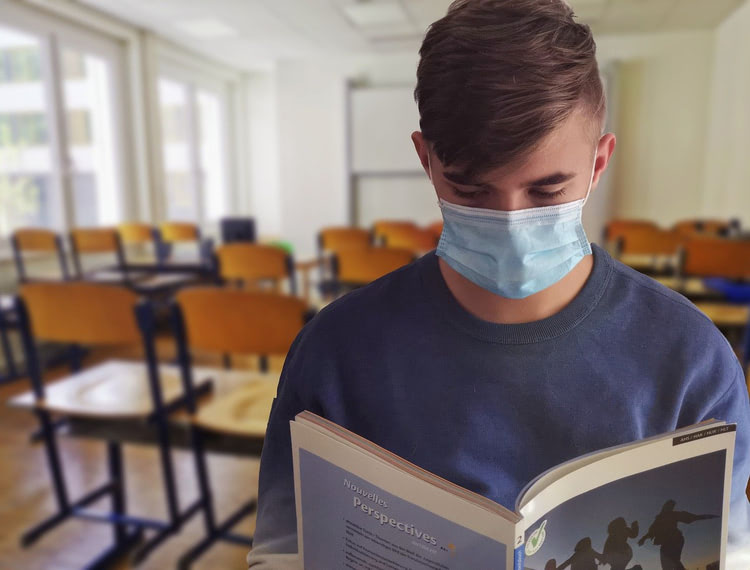Government must not take students’ resilience for granted

@UniversitiesUK has today (26 Mar) urged the government not to ignore the needs of over a million university students when deciding how to further ease lockdown restrictions in England.
Following the announcement of the roadmap in February, universities have been preparing extensively for a final phase of student returns from 12 April, and a range of Covid-safe in-person activities are planned to give students the best possible experience for the remainder of the academic year. These include blended teaching and learning, opportunities to use library, computing and studio spaces, on-campus sport, graduate support bootcamps, and creative use of outdoor space – in accordance with government guidance – to encourage group work and social interaction.
Other areas of the economy – including shops classed by the government as non-essential – are set for a welcome return to business on 12 April. But concerns are growing that the next stage of student returns will be delayed until 17 May at the earliest – despite exceptional campus safety records following staggers in January and March, and strong evidence of the benefits that a 12 April return would bring to the mental health, wellbeing and development of those students who have had no in-person teaching or access to facilities this year.
Professor Julia Buckingham, President, Universities UK said:
“University students have been extremely tolerant in the face of huge disruption and a radically different experience this year, and have willingly made sacrifices in the interests of public safety. But the government must not take their resilience for granted.
“Universities are fully prepared and looking forward to welcoming students back to Covid-secure environments as soon as possible after Easter, with a variety of enriching activities on offer including in-person teaching, access to study spaces, studios, and sports facilities, alongside additional support and catch-up programmes for those due to graduate this year.
“The government has said that decisions will be based on data, not dates. Universities have proven that the safety measures put in place – including regular asymptomatic testing, additional cleaning, support for self-isolating students and adherence to guidance on ventilation and face coverings – have enabled effective management of the virus on campuses, with minimal infection rates in face-to-face teaching settings and limited onward transmission to local communities.
“When making this decision, we urge the government to take account of the rigorous Covid-safety measures universities have implemented as well as the clear benefits for students of a 12 April return.”
A Department for Education spokesperson said:
“This has been a difficult time for students, and we are committed to getting all students back into university as soon as the public health situation allows.
“Students on practical and creative courses started returning from the 8th of March, and we will be reviewing options for the timing of the return of all remaining students by the end of the Easter holidays. Decisions will take into account the need to protect progress across the wider roadmap out of the pandemic, including the spread of the virus in communities and pressures on the NHS.”
- We recently distributed up to £70 million to help students most in need this financial year, for example those struggling to cover accommodation costs as a result of the pandemic, in addition to an existing £256 million available to universities.
- We have also worked with the Office for Students (OfS) to launch the online mental health platform Student Space, worth up to £3 million, in addition to the £15 million we have asked them to allocate to student mental health next year
- We have been clear that quantity and quality of tuition for those studying remotely should not drop and the Office for Students is monitoring to ensure this is the case.”
UUK estimates that as many as 50% of the 2.1 million higher education students in England are still being taught fully online, either in their normal term-time accommodation or at home, with no access to university-provided in-person learning, activities, or support.
Recent data published by the Office for National Statistics (ONS) revealed that almost two-thirds of students have experienced a decline in their mental health this academic year, and that students’ life satisfaction during the pandemic remains far below the national adult average. Universities UK has called for targeted government support for student mental health.
Universities continue to make significant investments in student and staff safety including updated risk assessments, Covid-secure measures, enhanced testing, and lessons learned from the autumn.
Measures include:
- adherence to mandatory social distancing
- continuation of blended learning even upon return (lectures remain online, in-person activities minimised, numbers using facilities such as libraries are controlled)
- reduced numbers on campus and using facilities
- increased hygiene measures across the university estate – teaching and learning spaces and in accommodation including enhanced cleaning and sanitisation stations
- assessment of adequate ventilation in accordance with guidance
- mandatory face coverings in all indoor public spaces in accordance with guidance
- regular review of risk assessments and a risk-based approach.
Previous data published by the ONS shows that infection rates of higher education teaching professionals are low compared to people working in other education settings. This follows prior research which revealed there is minimal evidence of Covid-19 transmission in face-to-face learning environments at universities, such as classrooms.
A recent recent Sutton Trust report on Covid-19 and the university experience showed that participation in extra-curricular activities this academic year is substantially down on normal. 39% of students reported taking part in student societies or sport in the autumn term, and this has fallen further since Christmas to just 30%. Almost half (47%) of students reported taking part in no wider enrichment activities at all this term, and they are also less likely to have taken part in work experience, paid work, or study abroad opportunities.
Universities have prepared a variety of additional activities designed to support final year undergraduates and postgraduate taught students who are graduating this year, including:
- Volunteering projects with local charities and schools
- On-campus and online employer-led events
- In-person self-development events, and one-to-one drop in appointments
- Intensive summer programmes to enable students on practical and practice-based subjects to spend more hours using specialist equipment and facilities











Responses